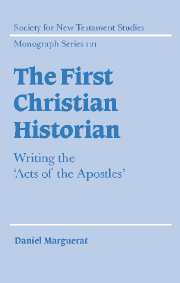Book contents
- Frontmatter
- Contents
- Preface
- 1 How Luke wrote history
- 2 A narrative of beginnings
- 3 The unity of Luke–Acts: the task of reading
- 4 A Christianity between Jerusalem and Rome
- 5 The God of Acts
- 6 The work of the Spirit
- 7 Jews and Christians in conflict
- 8 Ananias and Sapphira (Acts 5. 1–11): the original sin
- 9 Saul's conversion (Acts 9; 22; 26)
- 10 The enigma of the end of Acts (28. 16–31)
- 11 Travels and travellers
- Bibliography
- Index of passages
3 - The unity of Luke–Acts: the task of reading
Published online by Cambridge University Press: 22 September 2009
- Frontmatter
- Contents
- Preface
- 1 How Luke wrote history
- 2 A narrative of beginnings
- 3 The unity of Luke–Acts: the task of reading
- 4 A Christianity between Jerusalem and Rome
- 5 The God of Acts
- 6 The work of the Spirit
- 7 Jews and Christians in conflict
- 8 Ananias and Sapphira (Acts 5. 1–11): the original sin
- 9 Saul's conversion (Acts 9; 22; 26)
- 10 The enigma of the end of Acts (28. 16–31)
- 11 Travels and travellers
- Bibliography
- Index of passages
Summary
In writing his ‘Acts of Apostles’, Luke offers his readers a narrative of beginnings. This narrative of the birth of Christianity is part of a double work, which begins with the biography of Jesus. Henry Joel Cadbury was the first, in 1927, to call this ‘Luke–Acts’.
While it is true that this label had to wait for redaction criticism (Redaktionsgeschichte) to be more widely accepted in research, after Conzelmann it has become (almost) compulsory. If the unity of the authorship of the gospel of Luke and Acts, affirmed by the early Church, has never been seriously the subject of doubt, research is indebted to Henry Cadbury and subsequently to Martin Dibelius, for the impulse to explore the unity of the Lucan diptych on the literary and theological level.
‘Luke–Acts’ represents, therefore, a very recent concept in the bimillennial history of the reading of the New Testament. This concept imposed itself so rapidly in research that it can be considered today as a fait acquis. Since the 1960s a recognition that the gospel of Luke and the book of Acts were the work of the same author and a crystallization of the same theology has been the postulate of all research on Luke's text. In doing this, exegetes have made an important methodological decision, maintaining that a correct reading of Luke's work requires the uniting of what the canon of the New Testament has divided.
- Type
- Chapter
- Information
- The First Christian HistorianWriting the 'Acts of the Apostles', pp. 43 - 64Publisher: Cambridge University PressPrint publication year: 2002



